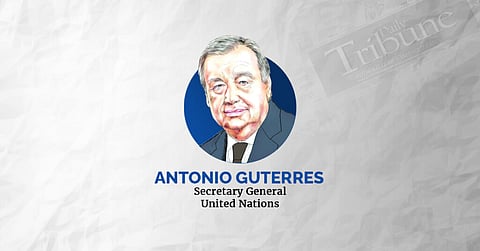
- NEWS
- the EDIT
- COMMENTARY
- BUSINESS
- LIFE
- SHOW
- ACTION
- GLOBAL GOALS
- SNAPS
- DYARYO TIRADA
- MORE

We meet at a time of profound challenges — both old and new. When current divides are growing. And the legacies of colonialism and enslavement continue to poison our world.
We still bear witness to the scourge of racism, which blights lives and stains societies. People of African descent continue to face injustice, exclusion, systemic discrimination and violence.
And even artificial intelligence (AI), which holds such promise for humanity, too often mirrors and amplifies the same inequalities and racial biases that have plagued us for centuries.
Power is concentrated in the hands of the few.
And too many people, countries and communities remain unable to benefit from all that these technologies have to offer.
The Permanent Forum on People of African Descent was established to challenge these injustices. To amplify the voices of people of African descent. And to accelerate progress towards a world of dignity, justice and equality.
To accomplish this goal, we must push for action at every level:
A critical objective is the need for reparatory justice frameworks grounded in international human rights law. Developed with the inclusive and meaningful participation of affected communities. That acknowledges the terrible harms and injustices caused, and their continued manifestations and ramifications. And that redresses past wrongs.
We need to eliminate bias from artificial intelligence, and to ensure that these technologies advance equality, inclusion and digital justice. Including by delivering on the commitments in the Global Digital Compact agreed last year. And by investing in capacity development to ensure people of African descent can shape, build and govern AI technologies.
And we must continue to address racism in all its forms — particularly where it is embedded in laws, policies and institutions.
All of us have a responsibility to play our part — international organizations, governments, businesses and individuals. And to drive action across this Second International Decade for People of African Descent.
In particular, I urge all countries to deliver on their commitments in the Durban Declaration and Program of Action — the blueprint for combating racism, racial discrimination and intolerance.
Together, with courage and with determination — let us forge ahead toward a world where the human rights of people of African descent are fully respected, protected, and fulfilled.
I wish you a productive session.
***
I am pleased to convey my heartfelt greetings to the G7+ Ministerial meeting as you mark your 15th anniversary in Dili — where your inspiring journey began.
This city, like many of your countries, symbolizes both the wounds of conflict and the strength and resolve it takes to overcome them — and I was deeply moved by your wonderful hospitality as we marked the 25th anniversary of the independence referendum last year.
Your people understand better than most the heavy cost of fragility — and the daily work of rebuilding lives with dignity and hope. Your organization was born from that spirit of resilience and purpose — and the shared recognition that lasting peace is the foundation of progress.
Over the years, you have championed cooperation, solidarity, and country-led solutions. You have also made a difference at the global level — including through your leadership in helping to secure Sustainable Development Goal 16 — on peace, justice, and strong institutions.
Yet, fragilities are deepening around the world. Protracted conflicts, widening inequalities, and a raging climate crisis are fueling displacement and instability — with your nations often bearing the heaviest burden, despite contributing least to these crises.
These plights cannot be ignored. The world cannot let your calls go unanswered. We need solidarity for solutions — and that is the spirit of the Pact for the Future that you helped shape.
The Pact charts a course to reform peace and security cooperation — prioritizing conflict prevention, mediation and peacebuilding. It seeks to strengthen coordination, including South-South cooperation, to develop innovative approaches, and expand opportunities for women and young people.
The Pact also calls for reform of the global financial architecture through:
Bigger and bolder Multilateral Development Banks;
Effective debt relief for fragile economies;
An annual SDG Stimulus of $500 billion;
And better access to concessional finance — recognizing vulnerabilities through the Multidimensional Vulnerability Index.
We must push the world to deliver on those commitments — including at the Fourth Financing for Development Conference in June.
And we must push for climate justice. Many of you are on the frontlines — watching as rising seas and extreme weather threaten lives and livelihoods.
As we prepare for COP30, we need to see countries turn promises into action.
Developed countries must scale-up adaptation finance. We need meaningful contributions to the Fund for loss and damage. And we need confidence the $1.3 trillion will be delivered.
Your journey over the past 15 years shows us that solidarity is a common responsibility.
As we work to tackle global challenges and implement the Pact for the Future, your voices will be vital — to strengthen multilateralism, prevent conflict, and forge a future of dignity and sustainable development for all.
(Excerpts of United Nations Secretary General Antonio Guterres’ remarks to the Fourth Session of the Permanent Forum on People of African Descent delivered by the Chef de Cabinet, Courtenay Rattray on 14 April 2025, and message for the opening of the G7+ Ministerial Meeting on 11 April 2025.)
